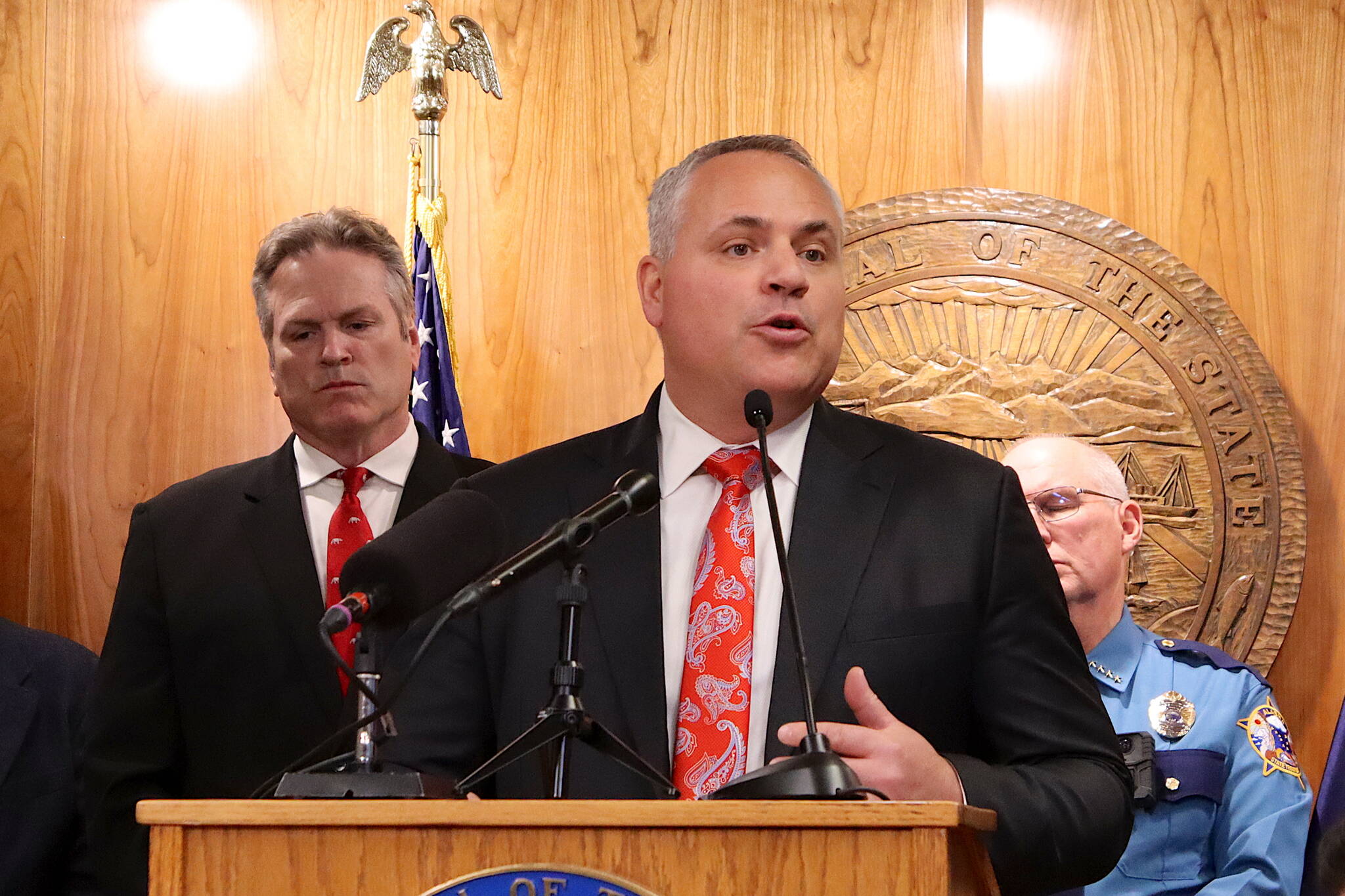A “separation of powers” lawsuit by the Alaska Legislature challenging Gov. Mike Dunleavy’s administration about a case involving state employee union dues was authorized Thursday by the Legislative Council.
Legislators voting 10-3 in favor of the lawsuit agreed with a legislative audit that finds the governor “very likely” violated state law by spending hundreds of thousands of dollars for outside legal work in the union dues case the administration is currently appealing to the U.S. Supreme Court. The Alaska Supreme Court ruled in May that Dunleavy illegally altered rules for union dues.
[Dunleavy illegally altered rules for union dues, state supreme court rules]
“I think the Legislature has the power to say ‘look, you’ve got a $50 million civil division. You have 200-and-some civil lawyers. Don’t use the $600 an hour contract attorney,’” said state Sen. Jesse Kiehl, a Juneau Democrat on the Legislative Council, in an interview after voting in favor of authorizing a lawsuit. “We can’t tell you what lawsuits to pursue. But we can tell you — and the courts have said something very similar in the past — we can tell you to do this the fiscally responsible way.”
The matter is “not an angry lawsuit,” Kiehl said.
“This is one of those situations where the Legislature and the governor just have a difference of opinion on where the constitutional line is, and we need to submit it to the third branch of government whose job it is to decide it,” he said.
Patty Sullivan, a spokesperson for the Department of Law, stated in an email response to questions from the Empire that the department “remains firm in its stance that the Legislature can’t use the budget to tell the executive branch what litigation to pursue and not pursue or by what means the Department of Law should litigate.”
“That is clearly a violation of the separation of powers,” she wrote. “The Legislature granted the attorney general broad discretion to pursue litigation in the public interest. It’s absurd to think that the Legislature could then use an appropriation bill to force the Department of Law not to pursue certain criminal prosecutions or civil litigation.”
The Legislative Council’s vote authorizes up to $100,000 for the lawsuit, but members were advised by legislative legal staff the cost could be more than that —possibly $200,000 to $300,000 if the matter is appealed to the state Supreme Court.
The dispute involves a lawsuit filed by the Alaska State Employees Association against the Dunleavy administration following a 2019 executive order by the governor requiring employees to opt into union membership via a form filed annually with the state. The order was based on a 2018 U.S. Supreme Court decision in Janus v. AFSCME finding government employees can’t be forced to contribute to labor unions representing them in collective bargaining.
The Dunleavy administration looked beyond its attorneys in hiring a $600-per-hour D.C.-based law firm to handle the case, which resulted in the Legislature in its 2020 and 2021 budget limiting such spending to a total of $20,000. Dunleavy vetoed that funding and subsequently spent more than $300,000 on the private law firm.
“The funds were inappropriate…we’re the only ones who own the purse strings,” said state Sen. Elvi Gray-Jackson, an Anchorage Democrat who chairs the Legislative Council, in an interview Friday.
Other legislators speaking during the council meeting also expressed concerns about the precedent it could set for allowing Dunleavy and future governors to have increased control over their spending and thwarting the will of the Legislature.
Sullivan, in her email response, didn’t dispute that “the Legislature absolutely has the purse strings.”
“What they don’t have is the authority to micromanage substantive decisions of a department through an appropriation bill,” she wrote. “And the decision as to whether to contract with outside counsel on a case is a substantive decision left to the discretion of the attorney general.”
Furthermore, “the audit report noted using the outside counsel for at least the amicus briefs was very likely cheaper than using in-house attorneys because outside counsel was already up to speed on the issues and could draft the brief more efficiently in these specific circumstances,” Sullivan wrote.
Rep. Sara Hannan, another Juneau Democrat on the council, also voted in favor of the lawsuit. Opposing the lawsuit were House Speaker Cathy Tilton, a Wasilla Republican; House Rules Chair Craig Johnson, an Anchorage Republican; and Legislative Council Vice Chair Kevin McCabe, a Big Lake Republican.
McCabe called a lawsuit “using a sledgehammer to do what we could do with a scalpel” by discussing the matter with the administration and saying “don’t do this again.” He said there also could be a troubling precedent for the Legislature if they lose the lawsuit.
“We all seem so certain, based on a couple of opinions and an audit, that the judge is going to rule in our favor and say ‘yes Legislature you have the power of the purse and what the attorney general did was was wrong,’” he said. “What if the judge doesn’t say that? What if the Supreme Court doesn’t say that? Now haven’t we given up some of the power that we have?”
• Contact Mark Sabbatini at mark.sabbatini@juneauempire.com or (907) 957-2306.

